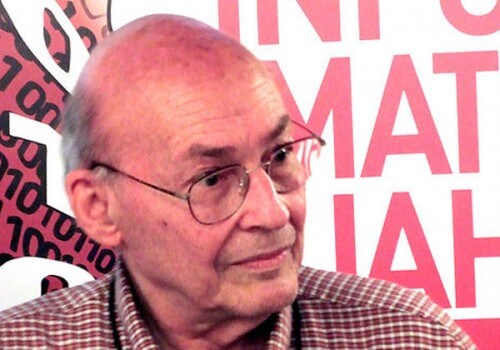Minsky died at the age of 88 from a cerebral hemorrhage ● He was one of the greatest experts in the field and won many awards, including the Benjamin Franklin Medal and the Dan David Award

Marvin Minsky, the pioneer of artificial intelligence, died at the age of 88, as a result of a cerebral hemorrhage. Minsky was a Jewish-American scientist who contributed greatly to the research and development of this world, was one of the founders of the MIT Artificial Intelligence Laboratory back in 1959 (along with John McCarthy) and wrote well-regarded books in the field.
On his page on the MIT website, which became a page in his memory, it is written that Minsky contributed to the fields of artificial intelligence, cognitive psychology, mathematics, computational linguistics, robotics and optics. In recent years he has worked to provide machines with a human-like ability to draw conclusions and use logic. His concept of the structure and function of the human mind was written in two books - "The Emotion Machine" and "The Knowledge Society", which was also the subject of the course he taught at MIT.
He received his bachelor's degree in mathematics from Harvard in 1950 and completed a doctorate in the field at Princeton in 1954. While still a student, in 1951, he built SNARC - the first simulator of neural networks using vacuum tubes.
Among his other inventions: mechanical arms and hands, other robotic devices and a focused scanning microscope. Minsky was a co-developer of the Muse synthesizer for musical variations and one of the first users of the logo language (the language of the turtles). He served as a member of the National Institutes of Science in the United States and Argentina and received many awards, including the Turing Award and the Benjamin Franklin Medal. About two years ago, Tel Aviv University and the Dan David Foundation awarded him the Dan David Prize.
Minsky saw the brain as a machine whose function could be replicated by a computer. His book from 1985, "The Society of Mind", is considered the fundamental work in the study of the variety of mechanisms involved in reason and thinking. His latest book, "The Emotional Machine", continues the theme and offers a new model for the issue of how the brain works.
went against the flow
The conventional wisdom is that the field of artificial intelligence is now in its golden age, with deep learning neural networks advancing in the fields of voice and image recognition. Minsky disputed this. In one of his recent interviews, which he gave to MIT Technology Review, he said that there has been very little artificial intelligence in the last decade. "My current work is trying to improve the systems, which are not good enough and have not improved for two decades," he noted at the time. On the other hand, according to Minsky, "the fifties and sixties are the ones that were wonderful in the field - there was something new every week".
He did not like the fact that large technology companies such as Google and Facebook are involved in the field of artificial intelligence. "We must get rid of the big companies and go back to giving support to individual people who will propose new ideas, because trying to commercialize existing things does not work well enough," he said.
The article was first published on the People and Computers website
More on the subject on the science website

4 תגובות
to his father,
Tal has to decide about identifying the reality of 'Minsky':
If the 'artificial brain' can function like Minsky's non-artificial brain, and it also exists - the article, and Tal's thanks - are unnecessary. 'Minsky' exists, and if so - to whom does Tal thank as someone who contributed in the past, but now he is one of a kind, and only his memory and memory of his work remain with us?
And if the 'artificial brain' cannot function like Minsky's non-artificial brain, and/or does not exist - the question returns to its place: to whom did Tal send the thanks?
to Eddie
to the royal mind that continues to function
And the answer will come from him.
Tal,
Who are you sending the thank you to?
Thank you Mr. Minsky for your tremendous contribution to the human race, on the shoulders of scientists like you the future of humanity is built. Rest in peace.